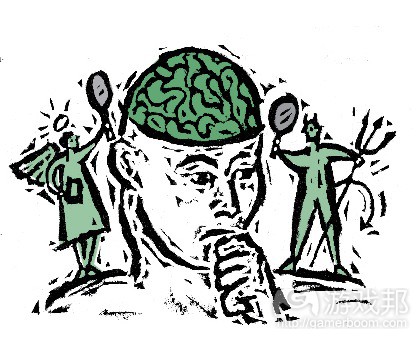游戏设计应慎用道德困境影响玩家体验
作者:Roland Jacob Bleaklove
道德困境有三种定义方式,每种都与这篇文章的主题有关,而且所有的定义都来源于第二版的《剑桥哲学辞典》。
1、任何与道德产生关联的问题。比如,我许诺去机场接自己最好的朋友。但是在我前去接朋友之前,刚好于所在的咖啡馆中碰到了崇拜的作家。我开始与这个作家交谈,从而陷入是否将友情置于此次谈话之上以信守诺言的道德困境。
2、任何引起道德拷问的问题。比如,当有人问起堕胎是否是不道德的行为时,此刻堕胎就属于道德困境。
3、从道德上来说两件事情都应该做但却无法同时实现的情况。Sarte的经典例子:某人需要照顾病危的母亲,同时也必须加入军队抵抗纳粹侵略者。
在下文中,我将阐述为何需要在角色扮演游戏中呈现道德困境,也会就应当如何处理这个问题提出自己的看法。
如果你感兴趣的是让你的角色或者你的玩家角色面对许多复杂的问题,并且讨论不同决定的后果,那么你就应当使用道德困境。道德困境的定义有些模糊不清,或者说很难得出明确结论。因而,玩家不可能简单地询问GM来得到问题的“正确”答案。这些困境需要角色思考、讨论并可能通过这些问题成长或与他人发生冲突。这就产生了戏剧性事件,从而为角色增添更多的细节。
现在我们该提出的建议是,不可在你认为只有唯一正确答案的情景中设置道德困境,随后惩罚那些与你意见不一致的玩家。同样对玩家而言,在游戏中拥有道德困境需要某些成熟度,不能惩罚那些与你想法不同的其他玩家。冲突是戏剧性的。如果你不想自己的角色只是单纯在屠杀怪物,那么用道德困境的设计方法可以产生作用,但角色的决定和想法不应当过于主观化。
以第1个例子中的道德困境为例,举个更具戏剧性的版本:你有机会通过与陌生人见面,从而找出杀害自己妻子的凶手,但是与此同时团队的其他成员都在进行殊死搏斗,如果你不帮忙的话很可能其中一个便会死亡。就个人而言,我喜欢这种获得知识(游戏邦注:或者某种成长)需要代价的情景。如果小组中的其他角色也是由玩家控制或者玩家至少可以从第一人称视角来查看角色,那么让你的角色放弃团队去追寻复仇之路或许就会是个很有趣的决定。更注重策略的玩家或许会在这种情形中感到愤怒,因为你让小队失去了在战斗中获得胜利的可能性,但是从反方向来看,身临你可以拯救团队或拯救自身的情景中,做出些“自私”的事情可以让玩家深入审视自己的角色,在小组内创造出更有趣的冲突。或者,如果你的角色因为拯救小队而失去了与陌生人见面的就会,那么这就可能让你的角色感到沮丧或者对整个小队产生不满。这会使得游戏带有戏剧性和深度,但是并非适合于所有的游戏。
在角色甚为完美的游戏中,不推荐使用道德困境方法。在这种情况中,角色原本就很棒,那么采用这种方式来加剧冲突便纯粹是邪恶的做法。将这些角色放于道德困境中会阻碍玩家获得角色本该在游戏中呈现出来的样子,并且使整个游戏的基调受损。最好的做法是,当启动新游戏时,先同玩家交流游戏的基调和主题,这样每个人都会知道他们应当玩的是何种角色,需要处理的是哪类情形。
游戏邦注:本文发稿于2008年12月9日,所涉时间、事件和数据均以此为准。(本文为游戏邦/gamerboom.com编译,如需转载请联系:游戏邦)
Using Moral Dilemmas In Games
Roland Jacob Bleaklove
Moral dilemma will be defined in three ways, each relevant for the purpose of this article, and each definition comes from The Cambridge Dictionary of Philosophy, 2nd edition.
1. Any problem where morality is relevant. Ex: I have promised to pick up my best friend from the airport. A writer I admire happens to be at the cafe I’m at before I’m to go pick my friend up. I start a conversation with the writer, and then am in a dilemma of promise breaking/valuing my friendship less than talking to someone I admire.
2. Any topic area where it is not known whether something is morally good/right or not. Ex: When someone asks if abortion is immoral in anyway this refers to abortion as a moral dilemma.
3. A situation where an agent morally ought to do each of two acts but cannot do both. Sarte’s classic example: a boy who ought to care for his sick mother but also ought to join the resistance to fight the Nazis.
I will now go over why moral dilemmas ought to be presented in roleplay games, and give some suggestions on how they ought to be handled.
If you are interested in having your characters, or your player’s characters act out complex issues, to discuss the consequences of their decisions, then you ought to use moral dilemmas. By their very definition, moral dilemmas are ambiguous, or at least challenging to reach conclusions to. It therefore ought not be possible for a player to simply roll a skill check to have the GM tell them what the “correct” answer is. These dilemmas necessitate the characters think, discuss, and possibly grow or conflict with one another over these issues. This creates drama and adds extra detail to characters.
It should be suggested now though that you ought not to create a moral dilemma where you, the GM, believe there is only one correct answer, and then judge the player for disagreeing with you. Similarly for players, having moral dilemmas in games requires some maturity and ability to both think as the character while distancing oneself enough to not judge the other players when they think otherwise than you. Conflict is drama. If you want the characters in your group to be more than monster killers or stats on a sheet this can help, but decisions and arguments in character should never be taken personally.
Also, for players, in moral dilemmas such as example 1. A more dramatic version of this: you have the opportunity to find out who murdered your wife by meeting a stranger BUT at that same time the rest of your group is fighting for their lives, and if you don’t show up to help it is likely one of them may die. Personally, I like scenarios where knowledge (or any kind of growth) has a price. If the other players in your group are actor-types or at least think of their characters from a first person standpoint, it can be fun and rewarding to have your character take a dark turn, abandon the group to pursue knowledge solely for vengeance. Players who are more tactical might get angry at such a decision because you hurt the group’s chance of winning a fight, but otherwise when presented with a situation where you can aid the group or aid yourself, in the right group, doing the “selfish” thing would be a way of exploring your character and creating interesting conflict in the group. Or, if your character misses the opportunity to go see the stranger to save the group this can give your character cause for depression or some resentment to the group. This creates drama and depth but will not be appropriate for every game.
It’s advisable to not use moral dilemmas in games where the characters are meant to be the paragons of virtue. In such cases when they are GOOD then it is probably best their conflicts be with purely evil types. Putting these characters in moral dilemmas interferes with the player’s ability to have the character the game is meant to have, and destroys the tone of the game. It’s best when starting a new game to talk to players about the tone, themes of the game so everyone is in agreement about what kind of characters they should play and what kinds of situations they’d be dealing with. (Source: Philosophy of Games)
下一篇:开发者应挖掘游戏跨平台开发潜力









































